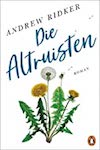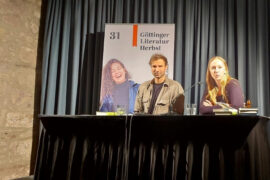This year’s Literaturherbst saw two novels about generations. While Stewart O’Nan sheds new light on the life of the elderly and infuses the mundane with wonder, Andrew Ridker’s trailblazing debut tackles the clash between millennials and baby boomers in a tragic but humorous way.
By Mara Becker
Picture: Von MabelAmber via Pixabay, Pixabay Licence
Before becoming an author, Stewart O’Nan was an aeroplane engineer. In the evenings, he would retreat into the basement of his house and write – trying to merge two genres that he was passionate about: horror fiction and philosophical treaties. It was his wife who finally convinced him to follow his dream of becoming a writer full-time, tossing safety overboard. On October 16, she sits in the first row at O’Nan’s reading in the Altes Rathaus. He smirks when he remembers how she explained to him that he had not been interested in anything else than his stories anyway – neither in his job nor in his children. Making writing his full-time job definitely did turn out to be a good decision: ever since the 1990s, O’Nan has been publishing novel after novel, seemingly with no end in sight. But – although he co-wrote a book with Stephen King that records their correspondence about the 2014 season of the Red Sox, an American baseball team – he bid goodbye to horror long ago.
»Nothing much happens«
In fact, it almost seems like his writing has doffed plot progressively – and, as the evening’s host Bernhard Robben assesses, Henry, Himself is no exception. »Basically, this novel is about the everyday life of your typical middle class senior. Nothing much happens«. The astonishment in his voice is unmistakable. O’Nan chuckles, hikes his shoulders. In his view, the relationships between people are what is most interesting about life. »Drama is how we feel about each other«, he summarizes – and hints perhaps at the reason for his increasingly scarce plot and the attention to detail, to mundane goings-on.

Reihe
The 28th Literaturherbst in Göttingen took place from the 18th until the 28th of October. Read our reports on the various events here.
In Henry, Himself O’Nan revisits characters that he established in two previous novels. To write a series about the Maxwell family, however, was never the plan. The original idea was to focus on the struggle of an older woman recently widowed. When he started writing Wish You Were Here at the beginning of the millennium, he was interested in how such a woman could be coping with life. What kind of challenges could she be faced with in her daily routines? Unfortunately, he fell in a sort of »Tolstoian reverie«, as he dubs it, developing an interest in all characters of the story to the extent that, when the novel was finished, he realized that it was not at all about Emily, the widowed woman. Therefore, he made another attempt a few years later and wrote Emily Alone.

Stewart O’Nan
Henry persönlich
Rowohlt: Hamburg 2019
480 Seiten, 24,00€
Now, another few years later, O’Nan has turned to Emily’s husband, Henry, whom – as Robben says – »we have only encountered dead before«. Through Henry’s eyes, the readers get a previously obstructed glimpse of Emily and their marriage. Again, it is a simple, not very adventurous life that O’Nan portrays – and still he manages to conjure up a sense of reality and authenticity that sticks with readers.
Bookish O’Nan
His erudition – exceeding the borders of horror and philosophy – comes to the fore on two occasions. One of the very first statements Robben makes in order to frame a question is that one hardly ever remembers first sentences of books – something that O’Nan calmly, but humorously scrutinizes. »Call me Ishmael«, he quotes Moby Dick. »It was the best of times, it was the worst of times«, he cites A Tale of Two Cities. Duped, Robben wrings his hands.
Moreover, just before starting to read a short passage from the original to lead over to Götz Lautenbach’s reading of the German translation, O’Nan explains how he had wanted to include a quote by Virginia Woolf at the beginning of the book, which did not make the final cut. He recites it anyway: »What is the use, she thought, of trying to tell people about one’s past? What is one’s past?«. It seems the slogan for his untalkative main character Henry, who is solitary in nature and has trouble socializing – even with his own family.
In this, he is no different from many other men of his generation. O’Nan expresses a deep interest in the life of the elderly – in the way that they cope with loss, with life, and with growing old. Much of O’Nan’s audience is comprised of people older than him, the 58-year old, and for research he actually hands out questionnaires to them: »If you don’t know it, ask«, he says. In his experience, people love to tell their tales, and most of his inquiries target their relationships. He asks about who they see on a daily basis, if there are people they would like to talk to more frequently, and what their regrets are. His resulting sensibility for this generation’s quarrels becomes palpable in Henry’s trips to the hardware store, his memories about working on a tulip field, and his hunt for a cat that he thinks he saw in the house. These descriptions of normal activities are what make this quiet book special.
Someone else taking a closer look at generations is Andrew Ridker. His highly anticipated debut The Altruists – the book rights sold in 20 countries before the novel was even published – focuses on the clash between baby boomers and millennials in the small space of family. In it, Arthur Alter invites his estranged children Maggie and Ethan in order to ask them for the money they inherited from their mother, Francine. He needs it to upkeep the family home, but because of the affair he had with a much younger colleague also during Francine’s cancer treatment, neither Maggie nor Ethan are much inclined to help him. Nonetheless, they agree to visit – and their family gathering brings to the fore each character’s dysfunctions: Generational conflicts arise almost naturally.
Of Altruism and Selfishness
28-year-old Ridker, who is compared to Jonathan Franzen, sits down on October 25 with Andrew Gross at the Literarisches Zentrum to discuss this »book of the town,« as Gross exclaims excitedly. Unlike the reading of Stewart O’Nan, their conversation is conducted entirely in English, which may be one of the reasons why this evening seems much more effortless. Imme Beccard reads short excerpts from the German version Die Altruisten and the way they have divvied up the talk works beautifully.

Andrew Ridker
Die Altruisten
Penguin Verlag: München 2019
400 Seiten, 22,00€
In his novel, Ridker combines the genres of comedy and tragedy to achieve a »new form of sincerity«, he says. He is interested in showing both the flaws and the merits of each of his characters, who are examples for two generations Ridker himself is fascinated with. The »children«, Maggie and Ethan, are millennials like he is. Their sense of displacement – especially concerning their purpose in the world – is heavily influenced by what he knows people his age struggle with. This is true especially for Maggie’s altruism, which shows in her giving everything she has to others in order to feel validated. »Isn’t that just a form of selfishness?«, Gross asks, to which Ridker confesses that this is one of the fundamental issues his novel deals with – just like his generation does. He tells the audience about his friends’ ponderings about how to leave the world a better place while supporting themselves at the same time, and who time and again get to the point where they question if true altruism is even possible under capitalism.
The other generation prominent in The Altruists is that of the baby boomers represented mainly by Arthur. As Ridker explains, he is by and large based on characters of the likes of John Updike’s protagonists. He describes how he wanted to write a character »difficult to love«. However, while writing about such a man, he wanted his novel to mirror current developments. Ridker is aware that he cannot refute the misogyny on the pages of many of his favourite authors. In his opinion, portraying Arthur, his affair, and the consequences for his relationship with his children without the perspective of women would be wrong. And indeed, the passages from Maggie’s point of view are some of the strongest in the novel. Moreover, he explains how he has paid attention to depicting Ulrike, the woman Arthur cheats on Francine with, in a multi-layered way, denying the cliché of the older professor and a younger scholar and instead making their relationship complicated, their characters equal to each other.
A Matter of Privilege
Guilt, as Andrew Gross remarks, is a recurring theme in Jewish-American literature. Ridker nods. He had never thought about his book being a Jewish book, but, as he recounts, everyone else did once they had read it – which made him rethink his initial viewpoint. »I want my book to be for all, but I cannot help but acknowledge that it grows out of a certain lineage«, he says. He mentions his upbringing in a demographically Jewish town, and speaks of the »matter of privilege«: while Jewish culture is at the centre of American culture, it is still not accepted as mainstream. The combination of guilt and privilege that he experiences is due to the fact that while he is aware of the history of oppression of the Jewish population, he has never personally experienced it. For him, Jewish literature in the future has to be about negotiating that history of trauma in the present day, where this fusion seems to work – but might be taken away again, taking into account the rise of antisemitic tendencies.
Encountering the past in the present is also one of the topics of The Altruists, which is comprised of almost as many flashbacks as present-day scenes. On this evening at the Literarisches Zentrum, the audience learns primarily about Maggie. Her relationship with her father shows in an excerpt about them discussing her vegetarianism, in which Ridker fluidly switches between her point of view and the perspectives of Arthur and Ethan. Moreover, the origins of her altruism are pointed at, as are her ponderings on the distributions of wealth. These are surprisingly entertaining passages in which one can always notice the dramatic undertone. Andrew Ridker is certainly one to watch – and has been a gain for this year’s Literaturherbst.






